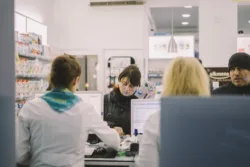The Risk of Addiction with Prescription Drugs

Prescription drugs are vital medicine for many people. They treat illnesses and medical conditions, and may improve quality of life. However, there could be a risk of misuse and even addiction for yourself or a loved one. Here’s what you need to know about prescription drug abuse.
Are Prescription Drugs Addictive?
When used as directed under a doctor’s supervision, there’s a lower risk for an addiction to prescription drugs. However, there are many drugs that pose the potential for abuse. Drug abuse, or misuse occurs whenever you use a drug in a way that was not intended by the manufacturer, or that goes against your doctor’s instructions. Misuse may consist of:
- Using a higher dosage than prescribed.
- Taking drugs that were not prescribed to you.
- Using prescription drugs recreationally.
Although many prescriptions are not considered addictive, abusing prescriptions in any of these ways can often lead to an addiction.
Signs of Addiction to Watch Out for
If you find that you are abusing prescription medications, you should talk to your doctor about it. They may be able to recommend an alternative treatment besides drugs, or they may refer you to a mental health professional for an addiction evaluation. Here are some warning signs to watch out for:
- Consistently using drugs at higher doses than prescribed.
- Using drugs even after your doctor has directed you to stop taking them.
- Lying to your doctor about symptoms in order to obtain a prescription.
- Going to different doctors to get multiple prescriptions, or more of a certain drug.
- Using multiple drugs at the same time.
- Experiencing withdrawal symptoms when you are not using drugs.
- Please be advised that you should not attempt to stop taking a prescription without direction and supervision from a doctor.
Factors that Contribute to Addiction Risk
Some people may abuse drugs without developing a dependency, while others may develop an addiction even while taking drugs as prescribed. Addiction is a complex disease with many different risk factors. There are also certain protective factors that may decrease your chances of developing an addiction. It’s important to be aware of your family medical history, as well as any risk factors you may possess.
Genetics and environment have a big impact on risk of addiction. There is also evidence that the earlier in life you start using substances, the greater your risk of becoming addicted. Teens’ brains are still developing, so they are especially susceptible.
Preventing Drug Abuse in Teens
If you have children, it’s important to be aware of the dangers of teen drug abuse. Teenagers may be exposed to drugs by their peers, and may be encouraged by friends to “experiment” with different substances. Talk with your teen about drug abuse, including the risk of addiction and even death.
Be sure to keep your prescription drugs locked away in a place where your children will not be able to access them. Taking this extra preventative measure can help protect your teen from prescription drug abuse.
Take Steps to Prevent Addiction
There are steps you can take to reduce the chances that you will develop an addiction when taking prescription drugs. First, inform your doctor of any family history of addiction. Genetics play a large role, so if a relative was addicted, you may be at risk.
Also be sure to only take prescriptions as directed. If you feel that your dosage is not high enough, talk to your doctor about your concerns, but never decide on your own to take a higher dose.
If your doctor has directed you to stop taking a medication but you still have some leftover pills, dispose of them in a safe and responsible manner. The United States Drug Enforcement Administration organizes Prescription Drug Take Back events so that you can dispose of unused prescriptions safely. You can also search for permanent collection sites near you to dispose your prescriptions safely at any time of the year.
Concerned about a Potential Addiction?
If you or a loved one has been showing signs of drug misuse or abuse, it’s important to address this early on. You may want to start by taking a self-assessment to see if there is a potential addiction present.
If you’re looking for someone to talk to about the symptoms you’re noticing, Rehab After Work has caring counselors available to help. Fill out a contact form or call us at (610) 644-6464 to speak with someone today.








